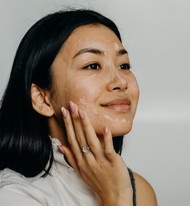5 Common Retinol Myths and Mistakes You May Be Making
Posted by JQ on Jun 11th 2022
Hey Beautiful!
Before we get started, it's important to note that Retinoids are powerful antioxidants derived from Vitamin A, and 'Retinoid' is an umbrella term for all of these derivatives.
Simply put, Retinol is something you can buy over the counter, while other Retinoids, like Retin-A, are only available by prescription.
As you may already know, I spend a lot of time creating content for you online, especially Tik Tok, and because of this I see a lot of conflicting information out there. So I thought I'd address the 5 most common myths I share with my clients.
Myth #1: All Retinoids are ideal for aging skin.
When Retin-A was first introduced it was intended for people with acne. Later, it became known for doing many other 'anti-aging' things we all enjoy and love after 40.
Nowadays, you can even purchase Differin OTC, (aka Adapalene) a low-percentage acne-fighting Retinoid which was once only available by prescription.
So what makes this product different than the one you want for aging skin?
While it does offer similar anti-aging benefits, when you invest in a good Retinol like our Advanced Retinol Night Cream it gives you all the benefits of Vitamin A without drying out your skin, which is a classic problem women over 40 face.
I do, however, commonly recommend this OTC Differin in my practice in conjunction with other gentler products for older teens battling acne.
The bottom line is that applying a Retinoid without other nourishing ingredients involved can lead to even more dryness and sensitivity, especially after 40.
Myth #2: Retinol thins out the skin.
Contrary to popular belief, when used over time Retinol will actually strengthen the over-all integrity of your skin. Sometimes it feels like this because it's increasing your cell rate turn over, bringing new skin up to the surface faster. For this reason, some people often confuse Retinol with being an exfoliating agent, like our Brighten and Reveal Pads. Since Retinol speeds up the process of cell rate turn over this means that proper exfoliation becomes more imperative.
Myth #3: Retinol has to be applied on dry skin.
There's no reason you can't apply Retinol on clean moist skin right out of the shower or bath the way you do other products unless your skin is sensitive. This is because water can increase the speed of the delivery, making it irritating on sensitive skin types. But if you're not too sensitive, this shouldn't matter too much.
To counter any associated dryness, flakiness and redness associated with prescriptions, make sure to apply a little moisturizer before and/or after applying your Retinoid or simply start with an OTC Retinol.
Myth #4: Retinol can't be used with other acids or Vitamin C.
Retinol formulations can be made or used with and without Vitamin C or other acids but there is a real thing as 'over-loving' your skin. Unless your product is formulated with these ingredients already in them, we recommend using them at different times so that you don't mix the formulations and possibly risk losing efficacy.
We also like this idea of using them at different times because you'll negate the chance of over-using actives that can also be irritating when you use too many at once.
Remember, you can't benefit from what you can't tolerate!
Myth #5: Retinoids can't be used during the day.
There's been a common misunderstanding that Retinoids can't be used during the day because it'll become unstable. Research indicates that UV exposure changes the composition of some retinoids BUT if you use a low-percentage Retinoid with sunscreen over it during the day it may be ok. Bottom line is, make sure to consult with your doctor first if you're considering using it during the day.
It's always easier to be on the safe side and protect your skin than it is to correct it.
That doesn't mean it's not better to use at night for other reasons, too. There are only so many products you can use during the day, and if you forget to put the correct sunscreen over your Retinol it could compromise your skin.
Using Retinol at night also ensures you won't decrease the efficacy of other products you're more inclined to synergistically use during the day, like our Vitamin C + Correcting Serum or other acid-based serums.
Questions? Thoughts? Let me know in the comments below!
Remember, the more you know the more you glow!
With love,
Jentri

